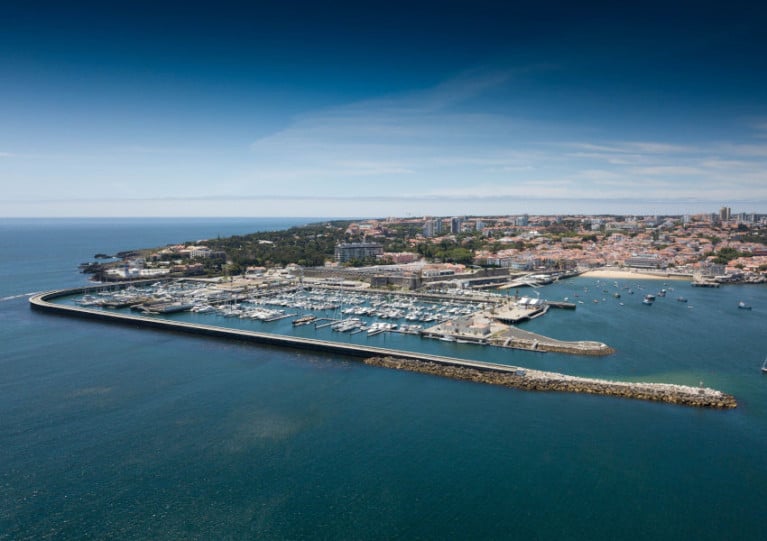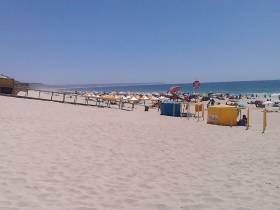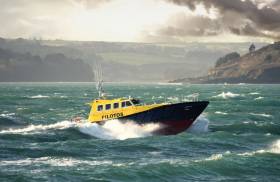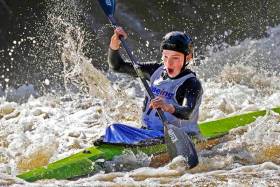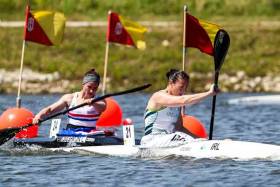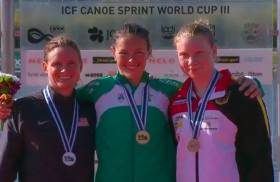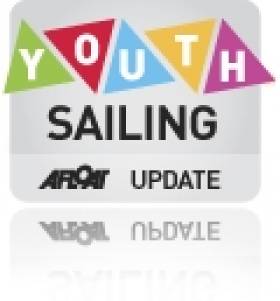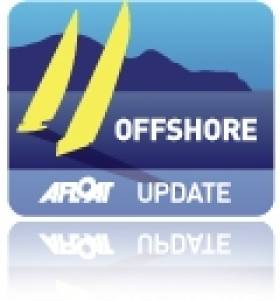Displaying items by tag: Portugal
Safehaven Marine’s 49th pilot boat is headed to Portugal this month following the completion of winter sea trials.
Celso Madeira has been commissioned for pilotage operations at the Port of Sines, south of Lisbon.
Powered by a pair of Volvo D13 500hp engines, the 26th Interceptor 48 produced by the Cork performance boat builders has an operational speed of 25 knots and a capacity of seven for pilots and crew.
 Celso Madeira in sea trials off the South Coast in December | Credit: Safehaven Marine/Facebook
Celso Madeira in sea trials off the South Coast in December | Credit: Safehaven Marine/Facebook
It’s the company’s second pilot boat for Portugal in three years, after the delivery of an Interceptor 48 to Leixoes in January 2019.
And it follows November’s delivery of another Interceptor 48 for pilotage at the Port of Waterford, as previously reported on Afloat.ie.
Following its start from Lorient in France at the end of May, the inaugural edition of The Ocean Race Europe will stop in Cascais, bringing the top international offshore racing teams in the world to Portugal.
Located 30km west of Lisbon, Cascais is a historic and cosmopolitan seaside resort on the edge of the Tagus estuary, between the Sintra mountains and the Atlantic Ocean.
The Ocean Race Europe will feature the record-breaking, one-design VO65 fleet which produced the closest edition of The Ocean Race in history in 2017-18. The teams are seeing the event as the first step on their journey towards the next edition of The Ocean Race round-the-world race in 2022-23.
And for the first time, the foiling IMOCA fleet will participate in a competition under The Ocean Race banner. The IMOCA teams bring a high-tech component to the event, showcasing the latest foiling technology.
“The Ocean Race Europe will surely provide us with great competition on the water. But it is also an opportunity for our wonderful sport to inspire towards a greater purpose,” said Richard Brisius, race chairman of The Ocean Race.
“We are united in driving action towards the promotion of ocean health and we look forward to working on this with all of our friends and partners in Cascais when we are in Portugal this June.”
The home team in Cascais, the Mirpuri Foundation Racing Team, was the first VO65 team to confirm its entry in the European race back in January and The Mirpuri Foundation will host the event from its training base at the Clube Naval de Cascais.
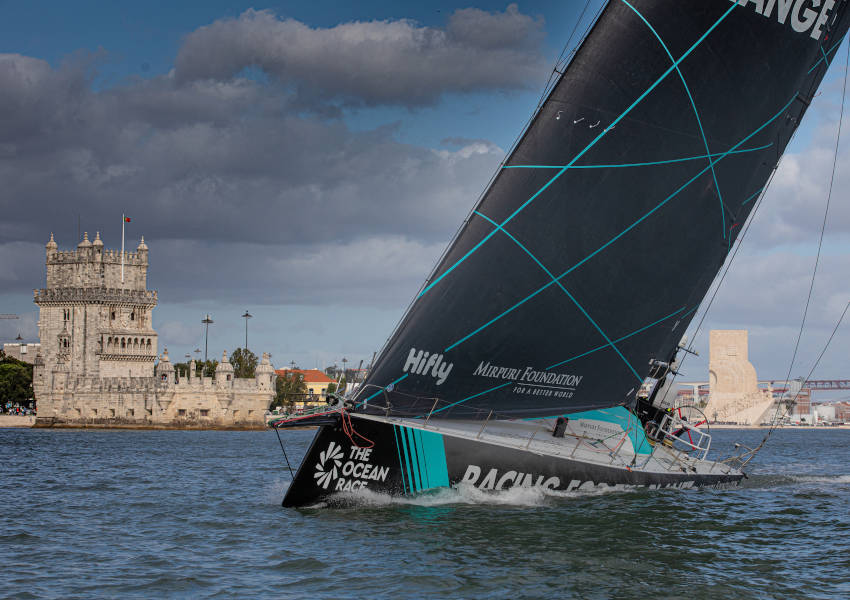 Mirpuri Foundation Racing Team training off Portugal | Photo: Marc Bow
Mirpuri Foundation Racing Team training off Portugal | Photo: Marc Bow
Paulo Mirpuri is the founder of the Mirpuri Foundation, which has been a driving force in bringing The Ocean Race Europe to Cascais. He said: “We are proud to welcome The Ocean Race Europe to Cascais and to host the stopover in our home port with our friends at Clube Naval de Cascais. This is the first time that an Ocean Race event has come to Cascais, having come to Lisbon in the past.
“Today’s announcement is the culmination of an enormous amount of work from many different parties. We have worked hard with the organisers of the race to bring The Ocean Race Europe to Cascais, our home, and we will have many more developments to share very soon.
“This will be a spectacular race after a difficult year for so many people and we cannot wait to welcome the fleet to Portugal.”
Cascais is known as ‘the charm of the Atlantic’ and provides direct access to a prime racing playground just off the main beach and the Cascais Marina area.
"Cascais is very proud to be one of the cities chosen to become a stopover for The Ocean Race Europe,” said Deputy Mayor Miguel Pinto Luz. “Sailing is a part of our identity and hosting the best regattas in the world is now a tradition here.
“We consider Cascais the best place to live - for one day or for a lifetime. And if you are a sailor, this is paradise…one of the best regatta locations in the world, in front of our beautiful Bay.”
Yoann Richomme, skipper of the Mirpuri Foundation Racing Team agrees, saying: “It will be an honour to lead ‘Racing For The Planet’ and our crew out from my home in Lorient and into our home port of Cascais this spring, a place we have seen many times from our boat, but never surrounded by such an incredible fleet.
“It will be a wonderful occasion for everyone involved. There is no doubt, The Mirpuri Foundation’s passion for sailing will be felt by everyone.”
The Ocean Race Europe will start from Lorient, France, over the final weekend of May, bringing the teams south across the Bay of Biscay, into the Atlantic and the stop in Cascais.
From there the two fleets will race into the Mediterranean. The Ocean Race Europe will finish in Genoa, Italy in the third week of June, with a further stop along the route in the Med to be confirmed shortly.
Irish Man Dies After Kitesurfing In Portugal
An Irish father of three has died after kitesurfing during a holiday in Portugal, as Independent.ie reports.
The man, named locally as Tom Griffin, took ill on Fonte da Telha beach near Lisbon last Wednesday 12 June.
Tribute have been paid by the community in Maynooth where he lived, including from Intel in Leixlip where he worked in semi-conductor fabrication.
Independent.ie has more on the story HERE.
Safehaven Marine Makes Deal With Two Spanish Ports After Latest Pilot Boat Delivery to Portugal
Following delivery of their latest pilot boat for the Port of Leixoes in Portugal, the Cork Harbour performance boat specialsts at Safehaven Marine announced the signing of contracts with two Spanish ports.
The port of San Ciprian has contracted for an Interceptor 42 pilot vessel while the larger Port of Coruna to the south-west has commissioned an Interceptor 48 pilot. Both are to be delivered in mid 2020.
Safehaven Marine says its pilot craft have proven very popular in the Iberian Peninsula.
Once these latest commissions are delivered — and the ports of Gijon and Algeciras begin undertaking pilot transfers with their own Interceptors — Safehaven will have 14 pilot boats working in the peninsula.
Both new contracts were signed simultaneously after pilots from Coruna and San Ciprian were impressed by sea trials of the new Leixoes pilot, named Lada, on delivery last month.
#Canoeing: Ronan Foley took gold medals on Saturday and Sunday at the canoe marathon World Cup in in Viana do Castelo in Portugal. The Kilcullen man dominated the short race on Saturday, and then sprinted away from his rivals on the last portage to win the marathon test on the Sunday.
Barry Watkins took silver in the senior race over the short course on Saturday and took 10th on Sunday – recovering from an unwanted swim in rough conditions.
Canoe Marathon World Cup, Viana Do Castelo, Portugal (Irish interest; selected results):
Saturday
Men – K1 Short Race: 2 B Watkins 13:46.15.
K1 Short Race, Juniors: 1 R Foley 14 min 52.43 sec.
Sunday
Men – K1 Marathon: 10 Watkins 2 hr 21 min 10.20.
K1 Marathon, Junior Final: 1 Foley 1 hr 53 min 7.34 sec.
Gold for Jenny Egan at World Cup in Portugal
#Canoeing: Ireland’s Jenny Egan won the K1 5,000 metres at the first canoe sprint World Cup in Portugal today. The 30-year-old paddler had just .77 of a second to spare over Spain’s Estefania Fernandez after the long battle. Lizzie Broughton of Britain was third.
Canoe Sprint World Cup, Montemor-O-Velho, Portugal Day Two (Irish interest)
Women
K1 200 – A Final: 9 J Egan 42.743.
K1 5,000 – Final: 1 Ireland (J Egan) 22 mins 52.8 seconds, 2 Spain (E Fernandez) 22:53.57, 3 Britain (L Broughton) 22:56.98.
Jenny Egan Qualifies for World Cup Final in Portugal
#Canoeing: Jenny Egan qualified for the A Final of the women’s K1 200 metres at the canoe sprint World Cup in Montemor-O-Velho in Portugal today. The Ireland paddler finished third in her semi-final to take the ninth and final place. On Friday, Egan just missed out on qualifying for the final of the K1 500, taking fourth in the semi-final. She will also compete in the K1 5,000 on Sunday.
Canoe Sprint World Cup, Montemor-O-Velho, Portugal (Irish interest)
Women
K1 500 – Heat One: 5 Ireland (J Egan) 1:56.116. Semi-Final (Three to A Final): 4 Egan 1:55.512.
K1 200 – Heat One: 6 Ireland (J Egan) 45.536. Semi-Final (Three to A Final): 3 Egan 42.103.
Gold for Jenny Egan at World Cup
#Canoeing: Jenny Egan won a gold medal at the canoe sprint World Cup in Montemor-o-Velho in Portugal today. In a sprint to the line in strong winds Egan had .99 of a second to spare over Margaret Hogan of the United States. Melanie Gebhardt of Germany took the bronze. Egan also reached the A Final of the K1 500 metres.
The Salmon Leap paddler took silver in the last World Cup in Racice in the Czech Republic.
#isafyouthnats – As Ireland hosts the Under–16 European Optimist Championships on Dublin Bay today, simultaneously the 44th edition of the ISAF Youth Sailing World Championship has been declared open by ISAF President Carlo Croce at the opening ceremony in Tavira, Portugal.
Ireland is represented by a team of seven boys and girls who have been recording some promising results recently.
The 2014 ISAF Youth Worlds features 67 nations, an event record, with more than 360 sailors set to compete in five classes across eight events in the Algarve.
Sixty seven flag bearers and their teams paraded through Tavira towards the City Hall with local people, tourists, family and friends turning out to welcome the sailors competing at the premier youth sailing regatta.
Ireland's youth team for Portugal is Laser Radial Boy: Séafra Guilfoyle (Royal Cork Yacht Club) Girl: Sarah Eames (Ballyholme Yacht Club) 420 Boys: Robert Dickson and Sean Waddilove (Howth Yacht Club) Girls: Lizzie and Cara McDowell (Malahide Yacht Club) and Sean Donnelly (National Yacht Club) and Patrick Crosbie (Royal Cork Yacht Club)
The traditional Mixing of the Waters followed, symbolising the collection and gathering of all the sailors from around the world. The 67 teams had brought bottles of water from lakes and seas from their home nation and poured them into a jug before the water was transferred into the Portuguese waters.
Speeches were delivered by ISAF President Carlo Croce, Chairman of the Organizing Committee Joao Pedro Rodrigues, Mayor of Tavira Jorge Botelho, Portuguese Sailing Federation President Jose Manuel Leandro and Secretary of State of Sports and Youth Emidio Guerreiro.
During the opening ceremony ISAF President Carlo Croce said, "I thank all of you for coming here from all over the world. The ISAF Youth Sailing World Championship is an important event and in its 44th year it's building up more and more. It represents the values of the International Olympic Committee. We see environment, accessibility, universality, fairplay and nice times for all.
"The sailors come to the ISAF Youth Worlds because it is the pinnacle event for a youth sailor. What I want to tell is, yes you're here to take the results of all your work but please remember that this event is for friendship. You need become friends with your competitors because you will meet them in the future and this is why sailing is a lifetime sport.
"I hope you enjoy your sailing and the regatta will be beautiful. The organizing committee have done a tremendous job and ISAF are pleased to be here."
As the ISAF Flag was hoisted Croce declared the 44th ISAF Youth Worlds open.
Sailors attentions now turn to the race action with the first start scheduled for 13:00 on Monday 14 July. Racing continues through to 18 July.
Missing Solo Sailor Airlifted To Cork Hospital
#Offshore - BBC News reports that a sailor who went missing last week during a solo voyage from Plymouth to Portugal has been located and airlifted to hospital after falling overboard.
The 66-year-old man set off last Monday 10 June but apparently suffered chest injuries during the first night.
Falmouth Coastguard has difficulty contacting the man to determine his position but he was eventually found some 225km off the Isles of Scilly. He was later transported by helicopter to Cork for treatment.



























